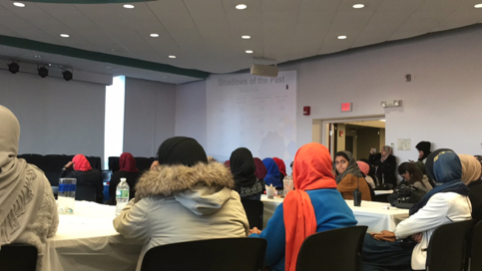It was a busy Saturday morning at the IHOP in Hamden, Connecticut.
All of the tables were full, so my friends and I sat at the benches in the front of the restaurant and waited to be seated.
A few minutes later, a woman and her friend entered. Her friend suggested she sit next to one of the five Muslim girls wearing the hijab (headscarf).
“I’m not sitting there,” she said, as she gave my friend a dirty look.
She made sure to sit as far away as possible from the five hijabis who were simply craving pancakes and crepes after a stressful week of school.
All over the world, Muslims are experiencing continuous backlash after the terrorist attacks in Paris left 130 people dead.
While ISIS claimed responsibility for the attacks, many Muslims are upset that a lot of people are basing their perception of Islam’s 1.6 billion followers, off of a small minority of people who claim to be Muslim.
The religion of Islam promotes peace, kindness, gentleness and fairness. The actions of ISIS prove the group does the exact opposite.

Though Muslims have continuously condemned the attacks that they have nothing to do with, anti-Muslim backlash has peaked yet again.
“Having the blame being put on Muslims has definitely spurred the fears of non-Muslims,” Thara Salam, a UConn student said.
After 9/11, data compiled by the F.B.I. found that anti-Muslim hate crimes are five times as common as they were before 2001.
Immediately after the Paris attacks, Islamophobic acts occurred all over the world, and continue to take place.
Mosques have been threatened, burned and vandalized. A Muslim woman was attacked outside her children’s school in Canada.
At San Diego State University, a Muslim student was battered in a parking lot and verbally assaulted.
Two men were taken off of a Southwest Airlines flight after a passenger heard them speaking Arabic and felt uncomfortable.
“I feel like a lot of people think it’s okay if Muslims get hurt,” Hamna Mahboob, a Quinnipiac freshman said.
Hate crimes directed at Muslims are not unknown to Connecticut either. A mosque in Meriden was shot at several times.
A Muslim student at UConn was the target of a hateful message written on the door of his dorm.

When Mahmoud Hashem returned to his dorm room the day after the Paris attacks, he discovered that someone wrote, “killed Paris” on his nametag.
Usra Qureshi, a freshman at UCONN, was in the same building when the incident occurred and is pleased with how the university responded.
“UCONN reacted overwhelmingly positively in terms of addressing it, making sure it got taken care of, and public awareness. I was very proud of the way UCONN handled it,” Qureshi said.
Hateful posts are also spreading on social media, but Muslims are not backing down. Immediately after the Paris attacks, #MuslimsAreNotTerrorist became the third trending hashtag on Twitter.
Ahmad Badr, an engineering student at Central Connecticut State University says, “I’m a very noticeable Muslim: I have a beard and I look Arab. So, it’s sad when you catch people treating you differently than any other American.”
Politicians are quickly feeding into the anti-Islam rhetoric. Donald Trump recently announced that he would “certainly implement” a database that would track Muslims throughout the United States. Trump also said he would consider requiring American Muslims to carry special identification cards that note their faith.
Muslims fired back on Twitter displaying their plethora of current identification cards.


Many say the current political climate is worse than after 9/11.
“I think politics has a major part in manipulating the citizens of our country and really playing on their fears, which is very unfair to the Muslims here,” Salam said.
Many American Muslims are worried about the tone of comments being made by presidential candidates after the attacks on Paris.
“I literally cannot believe that stuff like this is happening in the 21st Century in America,” Quinnipiac freshman Taqua Naeem said. “It’s absolutely ridiculous.”
Muslims are sick of the callous stares, anti-Islam rhetoric and biased media reporting.
Eradicating ignorance of Islam is what Muslims feel obligated to do.
“I think Muslims have to continue doing what we are taught to do, which is to lead by example and lead by manners,” Salam said.
Shortly after that lady refused to sit next my group of Muslim friends, another man walked into IHOP. He was an elderly man and my friend offered her seat to him, since there was no more room left at the benches.
He kindly opposed taking her seat, so the five of us squeezed next to each other to make room for him. He happily set next to five hijabis and thanked us compassionately.
At a time where there is so much hatred directed at Muslims, it’s imperative for people to realize that love overpowers hate, even in the slightest ways.


